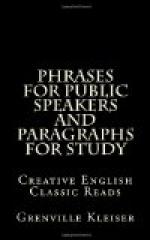From “Inaugural Address.”
* * * * *
I wish you, by the aid of the training which I recommend, to be able to look beyond your own lives and have pleasure in surroundings different from those in which you move. I want you to be able—and mark this point—to sympathize with other times, to be able to understand the men and women of other countries, and to have the intense enjoyment—an enjoyment which I am sure you would all appreciate—of mental change of scene. I do not only want you to know dry facts; I am not only looking to a knowledge of facts, nor chiefly to that knowledge. I want the heart to be stirred as well as the intellect. I want you to feel more and live more than you can do if you only know what surrounds yourselves. I want the action of the imagination, the sympathetic study of history and travels, the broad teaching of the poets, and, indeed, of the best writers of other times and other countries, to neutralize and check the dwarfing influences of necessarily narrow careers and necessarily stunted lives. That is the point which you will see I mean when I ask you to cultivate the imagination. I want to introduce you to other, wider, and nobler fields of thought, and to open up vistas of other worlds, when refreshing and bracing breezes will stream upon your minds and souls. George Joachim GOSCHEN.
From “On the Cultivation of the Imagination.”
* * * * *
But it is a noteworthy fact that eminent qualities in men may often be traced to similar qualities in their mothers. Knowledge, it is true, is not hereditary, but high mental qualities are so, and experience and observation seem to prove that the transmission is chiefly through the mother’s side. But leaving this physiological view, let us look at the purely educational. Imagine an educated mother training and molding the powers of her children, giving to them in the years of infancy those gentle yet permanent tendencies which are of more account in the formation of character than any subsequent educational influences, selecting for them the best instructors, encouraging and aiding them in their difficulties, rejoicing with them in their successes, able to take an intelligent interest in their progress in literature and science. John William Dawson.
From “On the Higher Education of Women.”
* * * * *
It only remains to remind you that another consideration has been strongly prest upon you, and, no doubt, will be insisted on in reply. You will be told that the matters which I have been justifying as legal, and even meritorious, have therefore not been made the subject of complaint; and that whatever intrinsic merit parts of the book may be supposed or even admitted to possess, such merit can afford no justification to the selected passages, some of which, even with, the context, carry the meaning charged by the information, and which, are indecent animadversions on authority. Thomas lord Erskine




